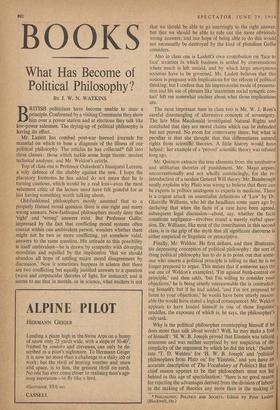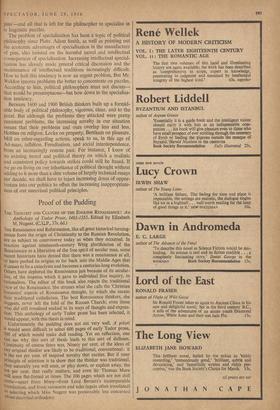BOOKS
What Has Become of Political Philosophy?
BY J. W. N. WATKINS BRITISH politicians have become unable to state a principle. Confronted by a visiting Communist they show him over a power station and at elections they talk like low-power salesmen. The drying-up of political philosophy is having .its effect.
Mr. Laslett has combed post-war learned journals for material on which to base a diagnosis of the illness of our political philosophy. The articles he has collected* fall into three classes : those which tackle some large thenie; modest technical analyses; and Mr. Weldon's article.
Top of class one is Professor Oakeshott's Inaugural Lecture, a wily defence of the shabby against the new. I hope the placatory footnotes he has added do not mean that he is turning cautious, which would be a real loss—even the most vehement critic of the lecture must have felt grateful for at last having something worth talking about.
Old-fashioned philosophers mostly assumed that to a properly framed moral question there is one right and many wrong answers. New-fashioned philosophers mostly deny that `right' and 'wrong' answers exist. But Professor Gallie, impressed by the fact that conflicting moral systems often coexist within one ambivalent person, wonders whether there might not be two Or more conflicting, yet somehow valid, answers to the same question. His attitude to this possibility is itself ambivalent—he is drawn by sympathy with diverging moralities and repelled by the implication 'that we should abandon all hope of settling major moral disagreement by discussion.' Now it sometimes happens in science that there are two conflicting but equally justified answers to a question (wave and corpuscular theories of light, for instance); and it seems to me that in morals, as in science, what matters-is not that we should be able to go unerringly to the right answer but that we should be able to rule out the more obviously wrong answers; and our hope of being able to do this would not necessarily be destroyed by the kind of pluralism Gallie considers.
• Also in class one is Laslett's own contribution on 'face to face' societies in which business is settled by conversations where much is left unsaid, and by which large anonymous societies have to be governed. Mr. Laslett believes that this notion is pregnant with implications for the reform of political thinking; but I confess that his impressionist mode of present' tion und his use of phrases like `maximum social synaptic con tact' left me somewhat unclear about what those implications are.
The most important item in class two is Mr. W. J. Rees's careful disentangling of alternative concepts of sovereignty. The late Miss Macdonald investigated Natural Rights and concluded that they are moral claims which can be defended but not proved. No room for controversy there; but what is peculiar is that she thought that this differentiates natural rights from scientific theories. A little history would have helped : her example of a `proved' scientific theory was refuted long ago.
Mr. Quinton extracts the true elements from the retributive and utilitarian theories of punishment. Mr. Mayo argues unconventionally and not wholly convincingly, for the re introduction of a modest General Will theory: Mr. Bambrougi neatly explains why Plato was wrong to believe that there can be experts in politics analogous to experts in medicine. There is a cogent attack on essentialist definitions of 'Law' by Dr Glanville Williams, who hit the headlines some years ago by declaring that when the facts of a case have been agreed subsequent legal discussion—about, say, whether the facts constitute negligence—revolves round a merely verbal ques. tion. Dr. Williams, like most of the contributors in this second class, is in the grip of the myth that all significant discourse is either empirical or linguistic or prescriptive.
Finally, Mr. Weldon. He first defines, and then illustrates his depressing conception of political philosophy : the sort of thing political philosophy has to do is to ,point out that some one who asserts a political principle is telling us that he is tic longer prepared to argue. This means that if someone says (to use one of Weldon's examples), 'I'm against birth-control on principle,' and then adds, 'but I'm willing to consider your objections,' he is being utterly 'unreasonable (he is contradict- ing himself); but if he had added, 'and I'm not prepared to listen to your objections,' he would have been utterly reason. able (he would have stated a logical conseqtence). Mr. Weldon appears to have landed himself in one of those linguistic muddles, the exposure of which is, he says, the philosopher's only task.
Why is the political philosopher overstepping himself if he does more than talk about words? Well, he may make a fool of himself : 'H. W. B. Joseph proved that Einstein was talking nonsense and was neither surprised by nor suspicious of the simplicity of the argument by which he did the trick.' (Substi- tute 'T. D. Weldon' for 'H. W. B. Joseph' and 'political philosophers from Plato on' for `Einstein,' and you have an accurate description of The Vocabulary of Politics.) But the chief reason appears to be that philosophers must not lag behind in this age of specialisation: 'there is no good reason for rejecting the advantages derived from the division of labour in the making of theories any more than in the making of * PHILOSOPHY, POLITICS AND SOCIETY. Edited by Peter Lasky. (Blackwell, 18s.) pins'—and all that is left for the philosopher to specialise in is linguistic puzzles.
The problem of specialisation has been a topic of political philosophy since Plato. Adam Smith, as well as pointing out the economic advantages of specialisation in the manufacture nl pins, also insisted on the harmful moral and intellectual utsequences of specialisation. Increasing intellectual special- isation has ,ttlready made general critical discussion and the maintenance of intellectual traditions increasingly difficult. I low to halt this tendency is now an urgent problem. But Mr. Weldon ignores problems the better to ,concentrate on puzzles. According to him, political philosophers must not discuss— that would be presumptuous—but bow down to the specialisa- tion tendency.
Between 1600 and 1900 British thinkers built up a formid- able body of political philosophy, vigorous, clear, and to the point. But although the problems they attacked were pretty persistent problems, the increasing novelty in our situation means that their problems and ours overlap less and less. Hobbes on religion, Locke on property, Bentham on pleasure, Mill on other-regarding actions, speak to us, in this, age of Ad-mass, inflation, Freudianism, and social interdependence, From an increasingly remote past. For instance, I know of 110 existing moral and political theory on which a realistic and consistent policy towards strikes could still be based. If we go on living on our inheritance of political thought without :tatting to it more than a slim volume of largely technical essays per decade, we shall have to inject increasing doses of oppor- Mnism into our politics to offset the increasing inappropriate- ness of our unrevised political principles.



































 Previous page
Previous page